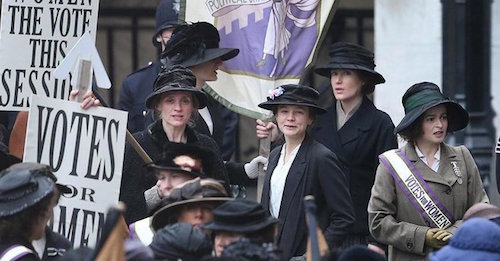Synopsis: The foot soldiers of the early feminist movement, women who were forced underground to pursue a dangerous game of cat and mouse with an increasingly brutal State.
Release Date: November 6, 2015 MPAA Rating: PG-13
Genre(s): Drama, History
Film Review

Production
This year, there has been a surprising number of movies about civil disobedience. From the feel-good Jimmy’s Hall to the god-awful Stonewall, theaters have been full of social activism and quests for political reform. There’s one more to add to the pile: the British feminist movement movie Suffragette.

Set in England in the year 1912, Suffragette stars Carey Mulligan (Inside Llewyn Davis) as Maud Watts, a young working-class mother who, through a co-worker named Violet Miller (Before I Go to Sleep‘s Anne-Marie Duff), is introduced to the Suffragettes, a group of women who are determined to gain the right to vote by any means necessary. At first, Maud is reluctant to join the movement, but soon she is convinced of its importance and becomes a foot soldier for the cause. The efforts are organized by a pharmacist named Edith Ellyn (Helena Bonham Carter from Fight Club) who is inspired by the preachings of an enigmatic leader named Emmeline Pankhurst (August: Osage County‘s Meryl Streep). As the fight wears on, Maud falls onto the radar of Police Inpector Arthur Steed (Calvary‘s Brendan Gleeson), a man who is tasked with tracking and neutralizing the Suffragettes. The movement has also put a huge strain on Maud’s family life, her husband Sonny (Ben Wishaw, the voice of Paddington) not able to raise their son without her around. Maud must balance her work, home, and activist life while avoiding legal trouble, never forgetting her ultimate goal of gaining the vote for women.
Suffragette has the feel of being a passion project, yet it doesn’t quite pull that passion out in the execution. It’s evident that the story and subject matter are very near and dear to the hearts of both director Sarah Gavron (Brick Lane) and screenwriter Abi Morgan (The Invisible Woman, Shame), but the finished product lacks the energy and emotion that it should have. It’s a wordy film, which would be fine if it weren’t for the fact that much of the dialogue is delivered with shrill, Monty Python-esque vocal inflections that just make the viewer want to tune out the all-important expositional dialogue. The few moments of genuine tension – an industrial accident here, a street riot there – aren’t enough to save the movie from its talky tedium. At one point in the film, the Suffragettes claim that they need “deeds, not words” to get their point across. The movie should have taken its own advice.
There is one scene in Suffragette that does what it’s supposed to do. Without spoiling anything, there’s a sequence at a horse race towards the end of the film that hits like a ton of bricks – it literally knocks the wind out of the audience, leaving its collective jaw on the floor. That’s the effect that the entire film should have, not just the one scene. Unfortunately, it doesn’t. But, the shocking scene does leave the right taste in the audience’s mouth at the conclusion of the movie.
Suffragette isn’t all bad. It just isn’t all good, either. It doesn’t quite hit the same chord with the audience that Jimmy’s Hall does, but it is worlds better than Stonewall. Those who have an interest in the time period or the struggle of the British Suffragettes will find it intriguing and engrossing. Others will find it tedious and boring.

Acting
Suffragette is the easiest paycheck that Meryl Streep ever cashed. The Oscar winner is in all of about five minutes of the movie, and most of her performance is relegated to delivering a single speech – not exactly the challenging type of work that master thespians relish. The rest of the cast is so-so; it’s a talented bunch, but they’re all pretty much wasted by the stuffy, two-dimensional screenplay. Carey Mulligan, Helena Bonham Carter, and Anne-Marie Duff are all way better actresses than their performances in Suffragette would indicate, although their characters aren’t given much to do aside from shriek their indiscernible lines in those high-pitched, annoying cockney accents. And Brendon Gleeson is just sleepwalking through his role, almost as if he realizes that he’s only there to give a human face to the governmental opposition which is faced by the film’s protagonists. For what could (and should) have been such a personal and powerful project, there’s a lot of phoning-it-in amongst the cast of Suffragette.

Cinematography
The most interesting aspect of Suffragette is, hands down, the photography. The movie was shot by cinematographer Eduard Grau (The Gift), who manages to capture perfectly the chaos and unrest of the women’s struggle. During the scenes of actual civil disobedience, Grau’s camera is shaky and unstable, almost as if it is more of a participant in the struggle than an impartial observer. When the dust is settled, Grau’s photography still lets the viewer know that things are in a state of distress by using ever-so-slightly moving Steadicam shots and tiny shifts in focus, just enough to keep the viewer on edge but nothing dramatic enough to overpower the senses. Grau’s work on Suffragette is subtle and understated, but it is extremely effective.
Cast and Crew
- Director(s): Sarah Gavron
- Producer(s): Alison OwenFaye Ward
- Screenwriter(s): Abi Morgan
- Story:
- Cast: Carey Mulligan (Maud Watts)Anne-Marie Duff (Violet Miller)Helena Bonham Carter (Edith Ellyn) Grace Stottor (Maggie Miller)Brendan Gleeson (Inspector Arthur Steed)Shelley Longworth (Miss Samson)Adam Michael Dodd (George Watts)Ben Whishaw (Sonny Watts)Sarah Finigan (Mrs. Garston)Romola Garai (Alice Haughton)Natalie Press (Emily Wilding Davison)Meryl Streep (Emmeline Pankhurst)
- Editor(s): Barney Pilling
- Cinematographer: Eduard Grau
- Production Designer(s):
- Costume Designer: Jane Petrie
- Casting Director(s): Fiona Weir
- Music Score: Alexandre Desplat
- Music Performed By:
- Country Of Origin: UK
